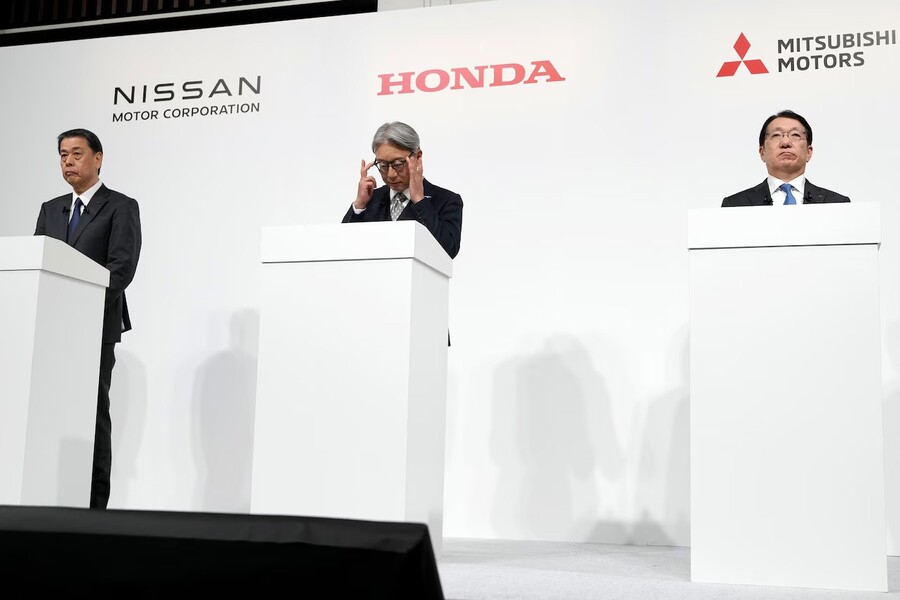In a historic move that could reshape the global automotive landscape, Japanese giants Honda and Nissan have unveiled plans for a merger that would create the world’s third-largest automaker by sales. The news, confirmed on Monday, signals a bold response to the shifting dynamics of the auto industry, particularly the fast-paced transition toward electric vehicles and the urgent need for cost-cutting measures.
A Strategic Merger for the Future of the Industry
The two companies have signed a memorandum of understanding, with smaller Nissan ally Mitsubishi Motors also agreeing to participate in the discussions. If the merger goes through, Honda, Nissan, and Mitsubishi would join forces under a joint holding company, marking a significant step in their collective effort to adapt to the industry’s evolution and to compete with global powerhouses like Toyota and Volkswagen. The planned merger is set to create an automotive behemoth valued at over $50 billion, with the combined entity expected to produce around 8 million vehicles annually—just short of Toyota’s 11.5 million vehicles, which remains the world’s top producer.
Honda’s president, Toshihiro Mibe, confirmed the decision in a statement, noting that Honda would initially lead the new holding company, with both companies preserving their brands and principles. However, Mibe also acknowledged that the formal merger discussions were still in the early stages, with key issues yet to be resolved. “There are points that need to be studied and discussed,” Mibe admitted. “Frankly speaking, the possibility of this not being implemented is not zero.”
The merger comes at a critical time for the automotive industry. With electric vehicle technology at the forefront of automaker strategies and growing pressure to reduce reliance on fossil fuels, Honda and Nissan find themselves in a race to catch up with their rivals in the EV space. While companies like Tesla, Volkswagen, and Toyota are forging ahead with electric and hybrid technology, Japanese automakers have struggled to maintain momentum in the EV race.
Nissan’s Financial Struggles and the Need for Change
Despite the potential benefits, the merger is not without its challenges. Nissan has been struggling in recent years, particularly following the high-profile scandal surrounding its former chairman, Carlos Ghosn, who was arrested in late 2018 on charges of fraud and financial misconduct. The scandal cast a shadow over Nissan’s reputation and financial stability, with the company reporting a significant loss in recent quarters. In November, Nissan announced plans to cut 9,000 jobs, or approximately 6% of its global workforce, as part of a broader effort to reduce costs and improve efficiency.
Nissan’s CEO, Makoto Uchida, acknowledged the company’s financial difficulties during a press conference, stating that Nissan’s situation was “severe.” Uchida also emphasized the importance of the merger in helping Nissan regain its footing and become more competitive in the evolving market. “We anticipate that if this integration comes to fruition, we will be able to deliver even greater value to a wider customer base,” Uchida said.
While the merger would help strengthen both companies’ positions in the global market, it could also result in a shift in the balance of power within the automotive industry. If the deal is finalized, the combined entity will have a significant scale, making it a formidable competitor to Toyota and Volkswagen, both of which have extensive partnerships and strong global market shares.
A New Era of Innovation and Cooperation
The merger could also bring new opportunities for collaboration in the electric vehicle sector, particularly in the areas of battery production, vehicle charging infrastructure, and software development. Nissan has long been a leader in electric vehicle technology, having developed the popular Leaf electric car, while Honda has made strides with its own hybrid and EV models, including the Honda Clarity.
In addition to their work in electric vehicles, the merger could help Honda and Nissan develop and expand their lineup of hybrid powertrains, which remain a key part of their strategy to meet increasingly stringent emissions regulations worldwide. As automakers move toward an electrified future, hybrid technology will continue to play an important role in bridging the gap between traditional internal combustion engines and fully electric vehicles.
Despite the uncertainties surrounding the merger, both Honda and Nissan remain optimistic about the potential benefits. Honda’s shares surged 3.8% following the announcement, while Nissan’s stock rose by 1.6%. However, Nissan’s share price has fallen significantly in recent years, prompting speculation that the company is undervalued, making it an attractive target for investors.
In the meantime, the Japanese government has remained largely silent on the merger discussions, with Cabinet Secretary Yoshimasa Hayashi stating that it was up to the companies involved to decide how to proceed. However, Hayashi did emphasize the importance of Japanese companies staying competitive in the rapidly changing global market. “As the business environment surrounding the automobile industry largely changes, with competitiveness in storage batteries and software increasingly important, we expect measures needed to survive international competition will be taken,” he said.
The merger between Honda and Nissan marks a new chapter for the Japanese automotive industry, one that is increasingly shaped by the transition to electric vehicles and the need for consolidation to stay competitive. As the two companies move forward with their discussions, the outcome could have far-reaching implications for the global automotive market, setting the stage for a new era of collaboration and innovation in the industry. Whether the merger succeeds or not, one thing is clear: the automotive industry is undergoing a profound transformation, and only the strongest and most adaptable companies will survive.

